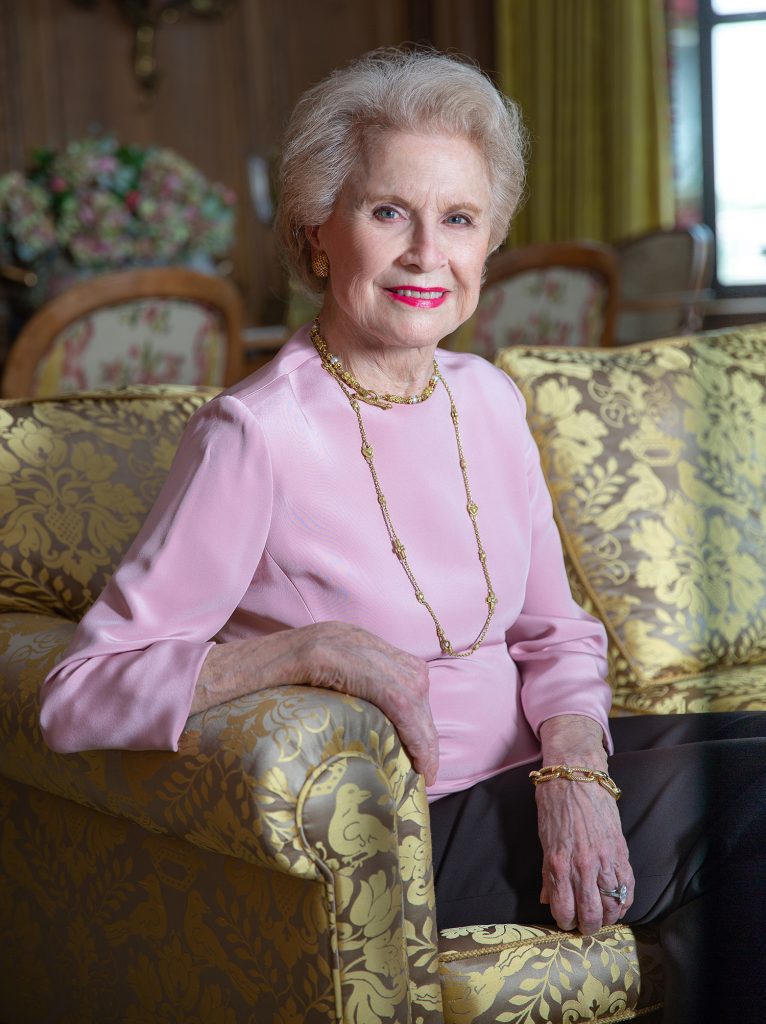ONLINE EXCLUSIVE
Her calendar brims with appointments and get-togethers.
PEGGY V. HELMERICH DISTINGUISHED AUTHOR AWARD
Award Presentation/Black-Tie Gala
6:30 p.m. Dec. 7
Central Library, Fifth Street
and Denver AvenueFree Public Presentation
10:30 a.m. Dec. 8
Central Library
For more information or to buy tickets to the dinner, visit helmerichaward.org
or call 918-549-7323.
Her slim build and vibrant facial features defy time and make you recall her films from the early 1950s.
And she could easily have the title of patron saint of Oklahoma libraries.
At 90, Tulsa philanthropist Peggy Dow Helmerich sets a fast pace. She squeezes in three workouts a week at a small gym into a schedule packed with board meetings and time with her dozen great-grandchildren.
“Oh, I don’t think I have a lot of energy,” she says modestly. “But if I keep the exercise going, that really helps.”
Helmerich has reached a point in life where social conventions can slack off a bit.
“Until you get to be 90, you kind of hide your age if you’re a woman,” she says. “But after that, you don’t care.”
As namesake of the Peggy V. Helmerich Distinguished Author Award, she and the Tulsa Library Trust have brought 33 literary giants (counting this month’s recipient, Hilary Mantel) to Oklahoma. They have included poets such as Billy Collins, novelists such as John Updike and playwrights such as Neil Simon.
“These are the most important authors of our generation coming to Tulsa,” Helmerich says. “They’re coming to see what we’re like. John le Carre came [in 1990] and people in New York couldn’t believe it.”
In addition to her longtime support of the Tulsa City-County Library system (the branch on East 91st Street is named for her), Helmerich has also helped to finance libraries at the University of Oklahoma and Oklahoma State University, as well as drama programs as OU and Northwestern University (which she attended).
The nearly half-century association with the Tulsa library began reluctantly.
Hilary Mantel receives Helmerich Award
Nearly 5,000 miles away sits a master storyteller painstakingly shaping the details of her country’s history into a page-turner to enlighten and delight millions of fans around the world.
Dame Hilary Mantel, England’s two-time Man Booker Prize-winning historical novelist, has worked for two years to complete The Mirror and the Light, the final installment in her internationally renowned, best-selling Wolf Hall trilogy about the rise of Thomas Cromwell in the court of King Henry VIII. She aims to publish it in fall 2019.
“It’s a huge and complex book, covering the time between the execution of Anne Boleyn in 1536 and Thomas Cromwell’s own death in 1540,” says Mantel, coming in December to receive the Tulsa Library Trust’s 2018 Peggy V. Helmerich Distinguished Author Award. “It’s not the story of his fall, as people sometimes assume. He has a long way to rise in the world before everything goes wrong after Henry VIII’s fourth marriage.
“Like the first two books, it demands … attention from an open-minded reader, but it gives a lot, too, in terms of political and psychological drama. It’s not the story you expect.”
Like its predecessors, The Mirror and the Light looks behind the scenes at one of the most volatile periods of English history with a story that is “bigger than time and place – about sex and love and power, about ambition and risk, success and failure when the stakes are high,” Mantel says.
– Jackie Hill
“Robert LaFortune was mayor and lived next door and he wanted me to be on the library board. I didn’t want to at first, but he knew enough about my doggone boys, so I agreed,” Helmerich says with a laugh. “And it was wonderful. I was stunned at how big the library system is.”
However, she came home overwhelmed after the first meeting and told her husband, oilman Walter Helmerich III, about doubting what she could do to help.
“Walt suggested taking the library’s small trust and expanding it,” she says. “We used our connections through the years to increase the trust [because] libraries are a treasure house of information and technology.
“The library is the headquarters for the public. People look for jobs at the library. Librarians and aides advise where people can go for social services.”
The Helmerichs were married for 60 years before his death in 2012. She went from Hollywood starlet – best known as Nurse Kelly in 1950’s Harvey with Jimmy Stewart, and Judy Greene in 1951’s Bright Victory with Arthur Kennedy and Rock Hudson – to young bride in the rolling greenery of Tulsa. They had their sons (Hans, Rik, Mat, Zak and Jon) and she got involved with the community.
However, Helmerich is quick to diminish her role in the family’s substantial philanthropy to scores of nonprofits and organizations in Tulsa and the state.
“My husband did all the funding; he just did stuff in my name, so I got the credit,” she says. “He gave quite a bit to the [Tulsa] ballet, opera and symphony and both museums [Philbrook and Gilcrease] – the arts in general – because they all give us quality of life.”
Helmerich has zero regrets about leaving Hollywood.
“I could see the writing on the wall,” she says of increasingly sordid expectations of actresses. “I saw it starting to change for the worse. The whole Harvey Weinstein type of thing has been going on for years.
“I had achieved what I wanted to do in Hollywood and I didn’t want that to happen to me. I wanted to be married and have children. Not many people stay married in Hollywood. I’d had enough of it, so I decided to leave.”
Helmerich also has no qualms about age and mortality.
“We are at the end – of our lives, of our work,” she says. “We don’t want to be sad about it. It’s marvelous to experience that much life. I’ve tasted so many parts of life.”
ONLINE EXCLUSIVE
Details on the Dame
Dame Hilary Mantel wins the 2018 Helmerich Award.
Nearly 5,000 miles away sits a master storyteller, painstakingly shaping the fine details of her beloved country’s history into a page-turner to enlighten and delight millions of fans around the world.
England’s two-time Man Booker Prize-winning historical novelist, Dame Hilary Mantel, has been working intensely for the past two years to complete The Mirror and the Light, the final installment in her internationally renowned best-selling Wolf Hall trilogy about the rise of Thomas Cromwell in the court of King Henry VIII, which she aims to publish in fall 2019.
“No one has ever won the Man Booker three times, and I don’t expect to,” says Mantel, who won the United Kingdom’s most coveted literary prize first in 2010 for Wolf Hall and again in 2012 for its sequel, Bring Up the Bodies. “I just want to deliver the best book of which I’m capable. It’s what I’ve been writing towards, all these years, the high point of my working life.”
Like its two predecessors, Mantel says The Mirror and the Light will shed light behind the scenes on one of the most volatile periods of English history, while offering readers a story that is “bigger than time and place;” a story about “sex and love and power, about ambition and risk, success and failure when the stakes are high.”
And like its two predecessors, the book is sure to delight the millions of readers around the world who anxiously await its arrival.
“A new Hilary Mantel book is an Event with a capital ‘E,’” says Maureen Corrigan of National Public Radio. “Heads always tend to roll – figuratively and otherwise … Hers is a brusque and brutal world leavened with humor – humor that’s available in one shade only: black.”
Born in Hadfield, England, in 1952, Mantel studied law at the London School of Economics and Sheffield University in the early ‘70s before finding her niche as an author a decade later with the publication of her first novel Every Day is Mother’s Day in 1985.
Over the years, Mantel has perfected her skills as a historical novelist, as she relishes the research.
“I have to stop myself getting deeper and deeper into topics,” says Mantel, who was made a Dame Commander of the British Empire in 2014. “It gives me great satisfaction to bridge the gaps in the record in a plausible way, to work out motive, and to master the detail and pick out the storyline: to find out what will work for my reader, without selling history short.”
On the downside however, Mantel sometimes finds it hard to reconcile the messiness of real-life events with the shape of a good story.
“I start to invent when the facts run out, and to do it on the basis of the best information I can get. But my process can only be explained case by case, example by example; I cannot justify my decisions in general terms, only particular terms – and that can be frustrating, because writers of historical fiction are always being asked to explain themselves.”
While she is best-known for her monumental Wolf Hall trilogy, Mantel also is a seasoned short story writer and an experienced playwright. In fact, after she completes her trilogy, she plans to write a play based on her short story The Assassination of Margaret Thatcher, which won the 2015 Audie Award for Short Stories/Collections.
“As co-writer for the plays based on Wolf Hall and Bring Up the Bodies, I learned a lot and I relish the challenge of the theatre,” she says. “I’ve spent a lot of time in a room alone, locked in with dead people, so it could be time for some live teamwork.”
ONLINE EXCLUSIVE WITH PEGGY HELMERICH
The memory is sweet – one that makes placid Peggy Helmerich almost tear up as she thinks of two men united by generosity, the Oklahoma oil patch and brotherly love.
Walter P. Helmerich III and Henry Zarrow, lifelong Tulsans who donated millions of dollars to scores of institutions and causes for more than a half-century, died within two years of each other. The former’s Helmerich and Payne and the latter’s Sooner Pipeline were landmark energy companies in the state.
Peggy Helmerich, married for 60 years before her husband’s death in 2012, recalls a moment that illustrates the men’s decades-long relationship.
“Henry and Walt were having lunch and Walt said he was going to give some money to the Presbyterian Church. Henry said he’d match it,” she says. “‘I do everything that you do because I love you,’ Henry said. And Walt said: ‘Henry, I’m a Methodist and you’re a Jew. What are we doing here?’
“And they just laughed … and gave the Presbyterian Church money. Walt loved Henry.”
Peggy Helmerich, 90, has seen much in the 67 years since arriving in Oklahoma after a two-year career as a Hollywood starlet.
“What I always have loved about Tulsa is that I came here as a bride and people just wrapped me in their hospitality,” she says. “They made me love Tulsa quickly. I was thrilled to death.
“Young people welcomed me. That young spirit is still here … just like the greenery. When I first came to Tulsa to see Walt before we were married, I saw all these lovely, rolling hills and gardens. The beauty of the city has continued.”
Her financial support and fondness for Tulsa and Oklahoma have never wavered. Helmerich has made sure that her “boys” – Hans, Mat, Zak, Rik and Jon – “sit on a bunch of boards. I can’t sit on all of them. Sometimes they want to be tight with the donations, and it makes me mad as a red hen.
“If they don’t give, I fill out the contribution and send it in. But they always come through with wonderful donations. They keep every arts organization in town under their wing.”
Helmerich is proud of the influence Oklahoma has had on her family.
“Yes, we’re a bunch of Okies,” she says. “Oklahoma is the real gateway to the West, not St. Louis. It’s wonderful that my kids and their kids are all part of this. Oklahomans have a group of values that makes us who we are.
“It’s a trust set in concrete. If you’re not trustworthy, no matter who you are, people know. We are Oklahomans and we are proud of it.”



























